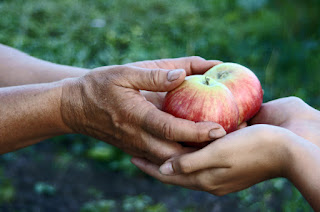As you have likely noticed this week, I have the theme of generosity on my mind. Often when we think about the word “generosity” we think of $$$. Being generous with our finances, our money. Generosity is defined as the quality of being kind. Other words we use for a generous person are words like “Big-hearted”, “self-sacrificing,” “kind,” “benevolent,” or “unselfish.” Those words cover many areas of generosity giving a broadness to the term. Not just $$$.
As I have been thinking about the methods to show generosity it occurred to me that being generous with our time was an important way of generosity. What do I mean? Well I am thinking about the time offered to others for “being present for someone”. I know that “being present” has found a place of over use in our culture, for you it might evoke images of therapeutic chats and tissue boxes. Not that this is a horrible image, but if “being present” becomes attached to just one context we miss something rather important.
“To be present”, simply means, I believe, to be intentional about putting ourselves in the presence of others, for their benefit. It’s giving the best of your time and the best of your attention to make someone feel valued.
If you have ever been in need of comfort, wouldn’t you agree that there is nothing better than a deep and meaningful chat with a friend, old or new.? Having a safe space and a safe someone we trust where we can discuss our life story for a while, with someone who gives us the gift of their time. Sharing stories and life experiences with someone who will listen without judgement and pray with us is something to be highly valued.
Galatians 6:2
“Bear one another’s burdens, and so fulfil the law of Christ.”
“Bear[ing] one another’s burdens” as this Bible text call us to do, involves a cost. This invites us away from being focused on self preservation and moves us toward an others focused mindset. People who are hurting aren’t always capable of giving us their best. Fact is when I’m the hurting person, I can be rather unbearable to be around. I’m so glad that I’ve had people in my life who stuck it out with me.
As a body of believers, as the Body of Christ, we know that if one part suffers, we all suffer (1 Corinthians 12:26). Helping others through suffering involves understanding where they are and walking with them to carry the weight of it. Ya, It might feel daunting at times, we may feel inadequate, but, now hear this please its powerful, we can bring those burdens with our friends to Jesus, who understands everything we go through and carries all our sorrows. We can entrust circumstances to him, knowing that he loves and takes care of our friends far better than we ever could. Jesus takes care of us too when the roles are reversed.
You know, in recent years there has been this movement in our society that encourages cutting negativity out of our life, more directed towards getting rid of “negative people” who as they say,“bring you down”. Of course, that’s healthy in cases where someone’s hurting you, constantly gossiping or putting you in danger. But this cultural advice of dropping people who drain you goes completely against the Bible’s teaching about how we look after each other.
Our verse today says, giving the gift of time to others and listening to their story is actually to “fulfill the law of Christ.” What does this mean? What is the law of Christ? I believe the answer to that is the law of love, “love your neighbor as yourself.” To bear one another’s burdens is to practice Jesus standard as described in the words he spoke “love one another as I have loved you.” (John 13:34)
.jpg)


.jpg)










.jpg)
.jpg)

